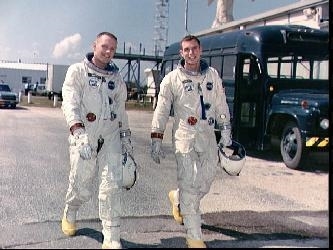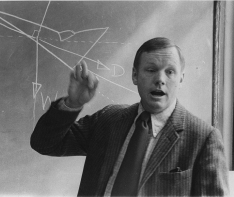There are few Americans who haven't heard the phrase, "That's one small step for man, one giant leap for mankind." Although famous for these words, Neil Armstrong was a hero among his colleagues, aspirers, and family for reasons that many people may not realize. Born in 1930 in Ohio, Neil Armstrong was not only the first man to walk on the moon, but a military pilot, an aeronautical engineer, program manager, and a professor. He was interested in flying at a very early age. In fact, he was only sixteen years old when he received his student's pilot license. He used this skill to go to college on a US Navy scholarship at Purdue University and ended up fighting in the Korean War for three years during which he flew 78 combat missions. After the war he became a test pilot, flying the X-15 aircraft, which could reach speeds up to 4000 miles an hour. Armstrong not only flew rockets, he helped with the research and development of vehicles that would eventually get him to the moon. Armstrong was a courageous, intelligent, and inspirational test pilot, teacher, and astronaut whose legacy has inspired future generations.
 |
| Neil Armstrong on Gemini 8 Mission (http://abcnews.go.com/topics/news/us/neil-armstron ()) |
Armstrong showed courage not only through his well known adventures in space, but in many of small things he did that might go unnoticed to the average eye. Even while under the pressure of losing his life, Armstrong remained calm and composed. An unmanned vehicle named Agena was launched from the Kennedy Space Center in Florida with Armstrong's Gemini 8 following. The purpose of the mission was to show that a successful rendezvous and docking could be made. Initially, everything went as planned with Armstrong smoothly completing the rendezvous, however after the two spacecraft were connected for a short period of time, something went wrong, and they went into a roll. Larry Merritt, a historian for aircraft manufacturer Boeing, recalls: "Armstrong used bursts from the Gemini maneuvering thrusters to straighten and steady the two spacecraft. But a few minutes later the roll began again, only faster. Concerned that the stress and strain of the violent rolling might break apart the two spacecraft and ignite the Agena's 4,000 pounds of fuel, Armstrong used the Gemini 8 maneuvering thrusters to undock and back away from the Agena." (Merrit). This event, among others, is one that the public most likely overlooks and could have turned out poorly, but it is the first time in history two vehicles docked in space. Armstrong's heroism goes beyond the expectations of those who know him only for his famous lunar expedition. His true courageousness and heroism is not his lack of fear, but how he could control it to save his mission and the lives of his coworkers.
 |
| (http://magazine.uc.edu/favorites/web-only/armstron ()) |
Even after working for NASA and the aerospace industry, Armstrong remained passionate for his work in space. He protested president Obama's decision to cancel NASA's Constellation space program saying, "America is respected for its contributions it has made in learning to sail on this new ocean. If the leadership we have acquired through our investment is simply allowed to fade away, other nations will surely step in where we have faltered. I do not believe that would be in our best interests." Armstrong's passion that remained in him throughout his life reveals his passion for his work in the early space program, and his determination to share experiences and open doors for new American space exploration. He is so set on retaining a long lasting program, that one could only regard him as a hero. Armstrong's passion spreads among young and old alike, showing his true prominent stance in his field.
Armstrong's inspiration has been apparent throughout his life as a family man, teacher, and astronaut. Many don't know of Armstrong career as a professor because he chose to lead a considerably private life. In an interview, he states, "I love to teach. I love the kids, only they were smarter than I was, which made it a challenge." (Rieslman). These words specifically embody his humble personality as a professor. He not only casually encouraged his students, but he gave them inspiration to surpass him. He knows that he is an icon of space exploration, but he is intelligent and wise enough to appear lower than his students so that he can push them forward. In an interview, Armstrong also quotes, "I believe that every human has a finite number of heartbeats. I don't intend to waste any of mine running around doing exercises." (Armstrong). Not only is this good life advice for all of his followers, but it also describes his life, as he didn't waste time on irrelevant things. This isn't a bash against fitness enthusiasts; it's encouragement for all that want to use his life as an example. Armstrong still gives inspiration to generations beneath him so that they can accomplish just as much as him.
A courageous, inspirational, and passionate leader, Neil A. Armstrong is a hero among those that know him fully, and those that don't. He motivates those who want to take up his field, and fills them with a hope of what they may accomplish. His humble attitude toward his work helps reinforce the world's vision of him as a leader, and a kind but thoughtful man.
Getting to know his achievements and passion has changed my perspective on how I want to strive for future accomplishments, so in the future I'll take my advice from a self-described "white socks, pocket protector, nerdy engineer:" "Shoot for the stars but if you happen to miss shoot for the moon instead."
Works Cited
Dunbar, Brian. "Biography of
Neil Armstrong." NASA. NASA, 18 Dec. 2012. Web. 2 May 2014.
"Neil
Armstrong." Contemporary Heroes and Heroines. Vol. 1. Detroit:
Gale, 1990.Biography in Context. Web. 4 May 2014.
Mills, John P., Ph.D. "What Led Neil
Armstrong to the Moon?" About.com Space / Astronomy. N.p., n.d. Web. 04
May 2014.
"Neil Armstrong Biography."
Bio.com. A&E Networks Television. Web. 4 May 2014.
Merrit, Larry. "Boeing Frontiers
Online." Boeing Frontiers Online. Boeing. Web. 4 May 2014. http://www.boeing.com/news/frontiers/archive/2006/march/i_history.html
Rieslman, Deborah. "Memories of Neil
Armstrong as a UC Professor, University of Cincinnati." Memories of Neil
Armstrong as a UC Professor, University of Cincinnati. UC Magazine. Web. 5 May
2014.
Page created on 5/24/2014 12:00:00 AM
Last edited 5/24/2014 12:00:00 AM
